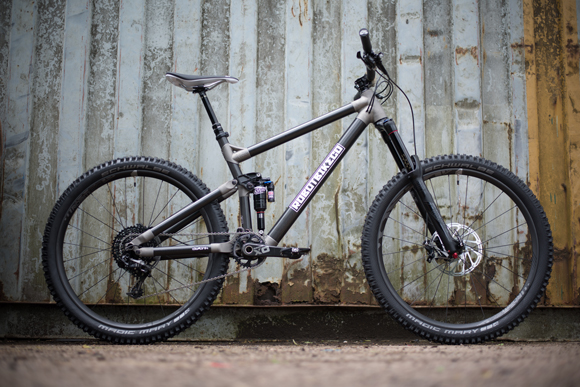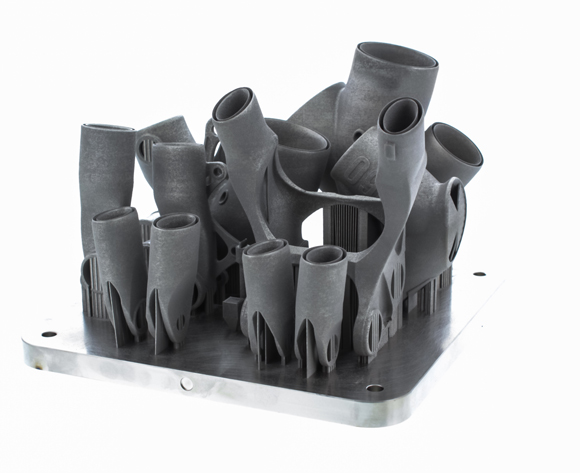Additively manufactured mountain bike offers flexibility and customisation
June 20, 2016

Robot Bike Co is a UK based specialist designer and manufacturer of lightweight, custom geometry mountain bike frames established in 2013. The company has recently introduced its R160 mountain bike frame, developed with partner companies Altair, HiETA Technologies and Renishaw, that utilises metal Additive Manufacturing to tailor each frame to a customer’s individual measurements or specifications.
The unique bike frame construction consists of titanium lugs, carbon fibre components and tubing and a double lap joint bonding concept. As well as offering numerous customisation opportunities, the use of metal Additive Manufacturing has the added benefit that the frame can be constantly improved as new technologies emerge, due to the fact that the production process is not constrained by use of costly moulds.
“If you are trying to produce the very best frame it makes no sense to then only offer it in a small number of sizes when the people you are selling it to come in all shapes and sizes. Think of Robot Bike Co as the Savile Row of the bike world,” stated Ed Haythornthwaite, one of Robot Bike Co’s founders.
The titanium lugs are manufactured at Renishaw’s Additive Manufacturing Solutions Centre, located in Stone, Staffordshire, UK. The production process starts with bespoke CAD geometries that are tailored to the individual customer. These are imported into Renishaw’s QuantAM build preparation software, where the optimum orientation for each part is selected and the support structures required for a successful build are specified.
The eleven lugs are grouped together to be produced in a single build. The combined CAD geometry is then ‘sliced’ into over 2,500 layers, each 60 microns thick. Finally, the QuantAM software defines the scan paths that will be used to melt the titanium powder to produce each layer.
The build process takes place on an AM250 laser melting machine. A 200W laser is focused onto a bed of powder, melting it to produce a fully-dense and immensely strong structure. The melting process is performed under an inert Argon atmosphere to ensure that the purity of the titanium alloy is preserved for optimum strength and durability. In the months ahead, production will switch to Renishaw’s new RenAM 500M system, which features a higher power 500W laser and an in-built powder recirculation and sieving system.
The build plate with the eleven lugs attached is removed from the laser melting machine and heat treated, also under Argon. Some of the lugs require finish machining to produce precision bearing features. The machining processes are set up and controlled using on-machine probing systems.
Finally, the lug production process is completed with inspection on a co-ordinate measuring machine.
“We have been delighted to lend our expertise in Additive Manufacturing, machining and metrology to deliver a high quality bike frame from an initial design concept. This typifies the approach that we are taking with our Solutions Centres, where we are working closely with our customers to create designs that maximise the production and lifetime benefits that can be gained from using an Additive Manufacturing process,” stated Marc Saunders, Director – Global Solutions Centres for Renishaw.

The R160 build plate with printed titanium lugs. Built using the Renishaw AM 500M
HiETA has extensive experience in designing for AM and has created a parametric 3D CAD design to enable rapid tailoring to the individual rider. This involves optimising the 11 titanium lugs and the eight carbon tubes to create a unique suite of solid models for each customer. This sophisticated configurator sits behind the Robot Bike Co website and does its work in just 20 seconds.
“One of the great aspirations of Additive Manufacturing has always been ‘mass customisation’. Leading this project has allowed us to see integration of all the elements – a great new frame design, the use of state of the art software tools for optimisation and automation, the flexibility of the manufacturing process itself and effective collaboration between our partners is a great advert for the technologies,” stated Mike Adams CEO of HiETA, a specialist Additive Manufacturing development and project engineering company based in the Bristol and Bath Science Park, UK.
Simulation specialist, Altair, was responsible for the optimisation of the bike’s additively manufactured connecters. Using solidThinking Inspire, Altair was able to maximize the benefit of Additive Manufacturing by identifying where material in the connectors could be removed to save weight and reduce part count without compromising performance. These engineering techniques are commonly used throughout the automotive and aerospace industries to maximize product performance but are equally valuable to bike manufacturers.
“This has been a very interesting and exciting project to be involved with,” stated Paul Kirkham, Team Leader at Altair’s Bristol office. “Additive Manufacturing is the perfect partner for design optimisation techniques as it allows us to produce components and systems that are far closer to the ideal balance of weight and performance. Robot Bike Co. now have a design that will offer its customer a bike that is truly innovative and unique.”
The suspension design has been developed and tailored for Robot Bike Co. by Dave Weagle, one of the world’s foremost suspension designers, who has a proven track record developing original and class leading suspension designs for mountain bikes.
The retail price will be around £4,395 with a lead time of 4 weeks, and the frames will be available to order from June 2016.
















